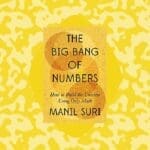 Manil Suri participated in the Bellagio residency program in 2016. During this residency, he worked on The Big Bang of Numbers: How to Build the Universe Using Only Math (WW Norton, 2022). Manil is Professor of Mathematics at the University of Maryland, Baltimore County and author of three novels, including The Death of Vishnu. He is a former contributing opinion writer at the New York Times.
Manil Suri participated in the Bellagio residency program in 2016. During this residency, he worked on The Big Bang of Numbers: How to Build the Universe Using Only Math (WW Norton, 2022). Manil is Professor of Mathematics at the University of Maryland, Baltimore County and author of three novels, including The Death of Vishnu. He is a former contributing opinion writer at the New York Times.
The Big Bang of Numbers was shortlisted for the 2023 PEN/E.O. Wilson Literary Science Writing Award.
A few words with Manil
“When I arrived for my residency, I was in the midst of an earlier version, which was written as a novel. After finishing that, I rewrote the entire book as non-fiction. I shaped the section on patterns at Bellagio, especially how so-called ‘fractals’ occur in nature.
“The scenery certainly helped my process (lots of beautiful clouds with fractal outlines!). It was also useful to try and explain mathematical concepts to the other (non-math) fellows, in order to see how successful my writing was. One idea, that of ‘incompleteness’ (as proved by Gödel) engendered so much cross-pollination that the fellow resident Francis Nyamnjoh [a Cameroonian Professor of Anthropology] used it in his own research, writing multiple works that incorporated a version of this concept.”
A quote from The Big Bang of Numbers
“The aim of my book is to challenge the popular notion that mathematics is synonymous with calculation. Starting with arithmetic and proceeding through algebra and beyond, the message drummed into our heads as students is that we do math to ‘get the right answer.’ The drill of multiplication tables, the drudgery of long division, the quadratic formula and its memorization – these are the dreary memories many of us carry around from school as a result.
“But what if we liberated ourselves from the stress of finding ‘the right answer?’ What would math look like if delinked from this calculation-driven motivation? What, if anything, would remain of the subject?
“The answer is ideas. That’s what mathematics is truly about, the realm where it really comes alive. Ideas that engage and intrigue us as humans, that help us understand the universe. Ideas about the perfection of numbers, the nature of space and geometry, the spontaneous formation of patterns, the origins of randomness and infinity. The neat thing is that such ideas can be enjoyed without needing any special mathematical knowledge or being a computation whiz.”
Synopsis
Our universe has multiple origin stories, from religious creation myths to the Big Bang of scientists. But if we leave those behind and start from nothing – no matter, no cosmos, not even empty space – could we create a universe using only math?
With evocative examples ranging from multidimensional crochet to the Mona Lisa’s asymmetrical smile, The Big Bang of Numbers charts a playful, inventive course to existence. Mathematics, Suri shows, might best be understood not as something we invent to explain Nature, but as the source of all creation, whose directives Nature tries to obey as best it can.
Explore More
To find out more about Manil’s work, you can visit his website or you can follow him on Twitter.